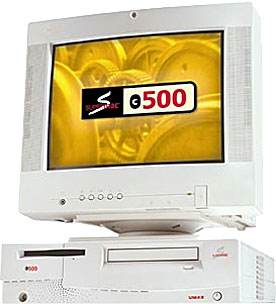The SuperMac C500 (known as the Apus 2000 series in Europe and Asia) was Umax’s entry level computer, perhaps the model that best met their corporate goal of making quality Mac OS computers at prices that could give PCs a run for their money. It may have been the least expensive Mac OS computer of its era.
 Initially introduced with 140 MHz PowerPC 603e CPU in August 1996, Umax was selling 240 MHz models by November 1997. The C500 was designed around a modified Tanzania motherboard. It has two PCI expansion slots on a daughter card.
Initially introduced with 140 MHz PowerPC 603e CPU in August 1996, Umax was selling 240 MHz models by November 1997. The C500 was designed around a modified Tanzania motherboard. It has two PCI expansion slots on a daughter card.
Tanzania-based computers will not boot with a dead 4.5V PRAM battery. Try replacing the battery before attempting to replace the power supply on a “dead” C500.
Not only was the C500 affordable, but it was the least expensive Mac clone with an upgradable CPU (and the first to use a ZIF socket).
Umax was the only clone maker to acquire a Mac OS 8 license from Apple, and version 5 installer CDs shipped with Mac OS 8.
- Got a SuperMac? Join our SuperMacs Group.
- Got a PCI Power Mac? Join our PCI PowerMacs Group.
Variants
- C500/140 (Apus 2140). 140 MHz CPU, 35 MHz bus
- C500/160 (Apus 2160). 160 MHz CPU, 40 MHz bus
- C500/180 (Apus 2180). 180 MHz CPU, 36 MHz bus
- C500/200. 200 CPU, 40 MHz bus
- C500/240 (Apus 2240). 240 CPU, 40 MHZ bus
- C500LT models are a second generation design introduced in 1997
- C500e models include ethernet
- C500i models include a 33.6k external modem
Specifications
- C500/140 introduced 1996.08.07, discontinued 1997.05.09
- C500/160 introduced 1996.09.24, discontinued 1997.07.01
- C500/180 introduced 1996.10.01, discontinued 1997.05.09
- C500e/180 introduced 1997.05.09, discontinued 1997.08.01
- C500i/180 introduced 1997.05.09, discontinued 1997.10.01
- C500e/200 and C500i/200 introduced 1997.08.04; discontinued 1998.03.01
- C500LT/140 introduced 1997.05.09, discontinued 1997.08.01
- C500LT/180 introduced 1997.05.09, discontinued 1997.08.01
- C500LT/200 introduced 1997.04.04, discontinued 1998.03.01
- C500/240 and C500e/240 introduced 1997.11.03, discontinued 1998.08.31
- requires System 7.5.3 through 9.1
- CPU: 140-240 MHz 603e
- bus: 35-40 MHz
- CPU performance, MacBench 5.0 (Beige G3/300 = 1000): 268 (180 MHz), 317 (240), 428 (240 w/CacheDoubler)
- RAM: 16-32 MB (16 MB on motherboard), expandable to 144 MB using two 168-pin DIMMs and 70ns or faster 5 volt EDO or fast-page (FPM) DRAM, 1 MB dedicated to video memory
- Video: RAM-based built-in video, 1 MB fixed, supports 16-bit color to 800 x 600 and 8-bit to 1024 x 768
- L2 cache: 256k, upgradable to 1 MB
- hard drive: 1.2-3 GB IDE
- CD-ROM: 8x (140-200 MHz LT), 12x (200 MHz), or 24x (240 MHz) SCSI drive
- ADB: 1 port for keyboard and mouse
- two miniDIN-8 GeoPorts on back of computer
- DB-25 SCSI connector on back of computer with SCSI-2 support
- PCI slots: 2
- ethernet: optional, uses PCI slot
- size (H x W x D): 4.0″ x 13.75″ x 16.0″ (101 x 349 x 406mm)
- weight: 16 lb. (7.2 kg)
Online Resources
Cautions
- When upgrading RAM, avoid 4K refresh memory, choosing 2K memory instead. EDO memory is preferable to FPM memory, since the 16 MB on the motherboard is already EDO RAM.
- Although CacheDoubler does great things for performance, field reports indicate you cannot use a USB PCI card with CacheDoubler installed.
- The version of FWB Hard Disk Toolkit that ships with the SuperMac may not be compatible with Mac OS 8 or later. You must use version 2.0.6 or later only if you are using a SCSI hard drive (with the IDE drive, use Apple’s Drive Setup that ships with system 8.0, 8.1, or 8.5.1), available on the software updates page. Be sure to install it on your SCSI hard drive before you run the OS 8 installer. Also, you must be sure that you do not update the driver on your hard drive during OS 8 installation. Using an incompatible version of FWB HDT or using the Apple driver on the drive that came with the SuperMac may so damage the hard drive structure that you will have to reformat it and reinstall everything. (As always, you should do a full backup before installing new drivers or updating your operating system.)
Keywords: #supermacc500
Short link: http://goo.gl/PYsgAN
searchword: supermacc500





